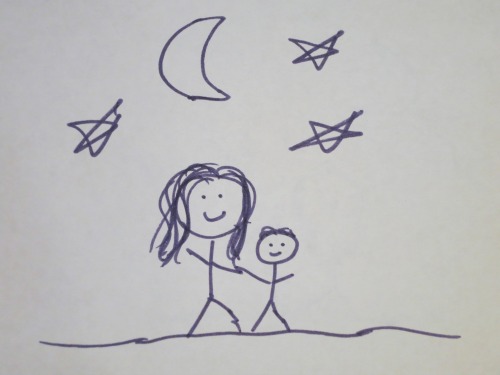
by Tara Bergman (USA) | Sep 27, 2013 | Babies, Being Thankful, Brothers, Childhood, Communication, Family, Humor, Kids, Milestones, Motherhood, Parenting, Siblings, Tara B., World Motherhood, Younger Children
 Potty training my three year old son has not been easy. He’s been resistant to the idea for quite some time. I chalk this up to two things. First, he has a willful spirit and often rejects my proposals on principle. Even when dealing with treats or play, if it isn’t his idea, he’ll pass. Second, my son verbalizes to me regularly that he is still a baby. (more…)
Potty training my three year old son has not been easy. He’s been resistant to the idea for quite some time. I chalk this up to two things. First, he has a willful spirit and often rejects my proposals on principle. Even when dealing with treats or play, if it isn’t his idea, he’ll pass. Second, my son verbalizes to me regularly that he is still a baby. (more…)
Tara is a native Pennsylvanian who moved to the Seattle area in 1998 (sight unseen) with her husband to start their grand life adventure together. Despite the difficult fact that their family is a plane ride away, the couple fell in love with the Pacific Northwest and have put down roots. They have 2 super charged little boys and recently moved out of the Seattle suburbs further east into the country, trading in a Starbucks on every corner for coyotes in the backyard. Tara loves the outdoors (hiking, biking, camping). And, when her family isn't out in nature, they are hunkered down at home with friends, sharing a meal, playing games, and generally having fun. She loves being a stay-at-home mom and sharing her experiences on World Moms Network!
More Posts

by Meredith (USA) | Sep 20, 2013 | Communication, Education, Family, Kids, Milestones, Motherhood, Parenting, Preschool, SAHM, School, USA, World Motherhood, Younger Children
 School will be starting for my children this week, and for many children this new routine and the new teachers can lead to much anxiety. Not only are the children feeling some of this anxiety but many parents are as well.
School will be starting for my children this week, and for many children this new routine and the new teachers can lead to much anxiety. Not only are the children feeling some of this anxiety but many parents are as well.
This past week, the teachers for my son and daughter called over the phone to introduce themselves before “meet the teacher” night. That same afternoon, a neighbor of mine called me to ask if I had received a phone call from my daughter’s teacher yet. I hadn’t at that time, and I could tell there was panic in my neighbor’s voice. She told me that she was very worried and upset that her son’s teacher this year was a “first year” teacher. She had been a teacher (and so had I), and we both know that the first year teachers do struggle a bit. But, in my opinion, the first year teachers bring with them the fresh ideas and new approaches to the classroom. I do understand her concern and could totally relate to her anxiety. (more…)
Meredith finds it difficult to tell anyone where she is from exactly! She grew up in several states, but mainly Illinois. She has a Bachelor of Science degree in Elementary Education from the University of Illinois at Champaign/Urbana which is also where she met her husband. She taught kindergarten for seven years before she adopted her son from Guatemala and then gave birth to her daughter two years leter. She moved to Lagos, Nigeria with her husband and two children in July 2009 for her husband's work. She and her family moved back to the U.S.this summer(August 2012) and are adjusting to life back in the U.S. You can read more about her life in Lagos and her adjustment to being back on her blog: We Found Happiness.
More Posts

by World Moms Blog | Sep 16, 2013 | 2013, Adoption, Adoptive Parents, Africa, Being Thankful, Cultural Differences, Discipline, Ethiopia, Family, Guest Post, Health, Humanity, Humor, Inspirational, International, Kids, Motherhood, Multicultural, Netherlands, Parenting, Special Needs, Uncategorized, World Motherhood, Younger Children
 Sometimes I’m really weary of explaining. To grannies in the supermarket. To teenage girls at the playground. To fellow mums at school.
Sometimes I’m really weary of explaining. To grannies in the supermarket. To teenage girls at the playground. To fellow mums at school.
My daughter is clearly adopted, yes. She’s from Ethiopia, yes. She’s had a rough start, yes. She’s lost part of her eyesight, yes. And she’s got some countless more issues, yes.
But she’s still a four year old. And I’m her mother. I’m raising her my way. Just like I’m raising her big brother, who is blond and looks a bit too much like me.
The big difference between raising my daughter and raising my son, is that people seem to feel a kind of responsibility towards my girl. It feels like adopted children are in a way public.
I do understand how we stand out, in our not so worldly little town. We are getting used to the extra attention she brings with her, although I admit I have been thinking to teach her to growl when a stranger touches her hair and skin unasked.
We were prepared for all this. We knew we were going to feel like we have arrows flashing around our heads when taking her out. Now that she’s been with us for two years, we’ve all grown a thick skin, filled with humor. We have a series of catchy replies to go with all the ridiculous questions. The next one who dares to ask me what we feed her, will be answered ‘grass’, without even a blink.
But I still can’t really cope with all the unwanted ‘advice’ we get about raising her. When my son was little, I never ever had some stranger giving him candy or cookies. I never had to explain myself in the supermarket when I refused to let him take everything he wished for. And I certainly didn’t have to listen to people telling me how neglectful I was for letting him cry out a tantrum.
With my daughter, I do have those encounters. This one time in the supermarket, I was truly abashed. I had just taken away some nasty sugar bombs from my daughter’s hands and put them back, much against the little miss’s wishes. An elderly lady came over, took the candy and handed them over to my girl again. I was confused, believing she misunderstood. So I explained I didn’t want to buy that rubbish for her. At that moment she cursed me for being so horrible towards that poor little black girl that has been hungry all her life. She put the candy in my cart, ordered me to buy it, and took off while nodding her head.
At such encounters – yes, plural – I have the urge to scream.
For one thing. She’s NOT a poor little girl. She’s in most ways an ordinary four year old preschooler. She can throw the worst tantrums I ever witnessed, just because I can’t peel an apple while driving my car or because I can’t make the Easter bunny magically appear in August. The last one was about having only six colors of nail polish to choose from. Poor girl indeed.
But most importantly, I’M THE ONE raising that ‘poor little girl’. Of course we are aware of her issues, mostly the ones regarding attachment and anxieties. We try to give her everything she needs, truck loads of patience and care which unfortunately aren’t always replenished in time. But she doesn’t need everything she wants. Just like any other child doesn’t. Unless you plan to end up with a spoiled brat that demands a yellow sports car at age eighteen.
Spoiling her will not make right all the things she missed out in the first two years of her life. Maybe that sounds harsh and loveless, but I can assure you it isn’t meant that way. I cry with her when she mourns her lost heritage, when she is homesick. I’ve swallowed away rivers of tears all those times I had to explain her history to medical doctors and hospital professors.
But I can’t raise my daughter based on pity alone.
This is a first-time, guest contribution to World Moms Blog from our friend and mother of The Penguin and the Panther in Belgium, Katinka. Her Flemish blog is in transition over to an English-only blog. Stay posted to World Moms Blog for more from Katinka.
The photograph of the author’s daughter used in this post is credited to the author.
World Moms Blog is an award winning website which writes from over 30 countries on the topics of motherhood, culture, human rights and social good. Over 70 international contributors share their stories from around the globe, bonded by the common thread of motherhood and wanting a better world for their children.
World Moms Blog was listed by Forbes Woman as one of the "Best 100 Websites for Women 2012 & 2013" and also called a "must read" by the NY Times Motherlode in 2013. Our Senior Editor in India, Purnima Ramakrishnan, was awarded the BlogHer International Activist Award in 2013.
More Posts

by hjunderway | Sep 9, 2013 | Culture, Expat Life, France, World Motherhood, Younger Children
 Two years ago, I said goodbye to the 100+ friends that had started off as co-workers and quit my job in preparation to leave the United States and move with my husband and son to Paris, France.
Two years ago, I said goodbye to the 100+ friends that had started off as co-workers and quit my job in preparation to leave the United States and move with my husband and son to Paris, France.
Working in the mental health field, where burnout rates are a true reality and there are constant shifts in schedules and treatment, we had a saying; “Change is hard.” We said this a thousand times to help solidify the “change” in our minds and to mentally prepare ourselves for the differences between the experiences we had before the transition and the ones we braced ourselves for afterwards.
Change is hard. Again my family is faced with major changes as our expatriate contract is unexpectedly ending and we are returning home to the United States. However this time, we are leaving with a four-year old who attends school daily, has friends, and identifies Paris as “home.” Our son speaks two languages, prefers baguette to sandwich bread, and thinks everyone has gouter at 4:00 p.m.
When we arrived in Paris, HJ was only two years old and to him, home was wherever his parents and toys were. We had to do very little to prepare him for the transition, but realizing that he is now a little person with thoughts and most importantly, feelings, preparation to move back to the United States will take on much more of a significance for us.
How do you prepare a young child for such a big change? Do you tell them months in advance, or do you wait until the week before? Do you play up the excitement of the move or downplay it to ease anxieties?
As a therapist, and most importantly, as a mother, I feel it truly depends on the child. For HJ, waiting approximately two weeks before the movers come to pack up our apartment for the overseas shipment will be the right time. For younger children, this might be too long of a time frame for them to understand and for older kids, who are more emotionally invested in their expatriate community, may need substantially more time to process.
My son doesn’t understand weeks or months yet. He knows “now,” “soon,” and “later.” So for him and for children who don’t understand time frames yet, parents can utilize a paper chain by simply cutting strips of colored paper and stapling them together to form a chain. Each link represents a day; link enough to cover the amount of time you have before the transition day arrives. For older kids, they can write something they are excited about or conversely, sad about the transition. Each day as you move closer towards the change, you can rip off a link in the chain, and kids can visually see the transition day as it approaches.
Once your time line has been established, the process of understanding the change can begin, which can be accomplished in a variety of ways. The first is through writing a social story; this is a story you can write in a basic word document that will outline the specifics of the upcoming change.
For our family, we’ll talk about returning home to America, feature photos of our home in the US as well as those of preferred family members. The focus will be on what things will change for our son when we leave. Including pictures of his new school and perhaps of the teachers who will be working with him will be helpful. We’ll also emphasize the fact that at school, his teachers and classmates will speak English, which is a huge change for our son. Another way to help prepare for the upcoming change is to have your child participate in packing, allowing them to feel like they have control over the change. For our son, this means having him pack his own suitcase of preferred clothing and toys.
The second thing is to, in essence, mourn the loss of the experience your child has had. Allowing them to share feelings of sadness and loss in regards to saying goodbye to friends they’ve made is an important part of the process. Depending on the age of your child or their emotional development, it may be helpful to purchase an address book, gathering mailing/email addresses, as well as Skype names. For close friends, planning Skype dates ahead of time can be helpful and gives kids something to look forward to.
Another way to embrace and remember the specifics of the current experience, it may be helpful to spend time seeing favorite places, gathering mementos, and taking lots of pictures. Using online software like Shutterfly, you can create photo books for children to look at if they are feeling sad after the transition.
Change is hard, and by sharing this process with my son, I’m hopeful that I too can prepare myself for the transition from France back to America!
Moms, what are some tips you might have to help moms like me help their children with changes and transitions?
This is an original post for World Moms Blog by Jacki of HJUnderway in Paris, France, who is preparing to move back to the United States with her husband and son, HJ, aged 4.
The photograph used in this post is credited to the author.
Jacki, or “MommaExpat,” as she’s known in the Internet community, is a former family therapist turned stay-at-home mom in Paris, France. Jacki is passionate about issues as they relate to mothers and children on both domestic and international scenes, and is a Volunteer Ambassador for the Fistula Foundation. In addition to training for her first half marathon, Jacki can be found learning French in Paris and researching her next big trip. Jacki blogs at H J Underway, a chronicle of her daily life as a non-French speaking mom in France.
More Posts

by Karyn Wills | Sep 2, 2013 | Brothers, Childhood, Education, Family, Life Balance, Motherhood, Nature, New Zealand, Parenting, World Moms Blog, World Motherhood, Younger Children
 When my boys were learning to roll over, I never stopped them from bumping their heads on the floor. We had carpet, vinyl and tiles, and they had access to all of those surfaces and often rolled from one to another. By the end of the first week there had been a few bangs and tears, but nothing that couldn’t be sorted with a cuddle and rock in my arms – and they had all learned to lift their heads up as they rolled.
When my boys were learning to roll over, I never stopped them from bumping their heads on the floor. We had carpet, vinyl and tiles, and they had access to all of those surfaces and often rolled from one to another. By the end of the first week there had been a few bangs and tears, but nothing that couldn’t be sorted with a cuddle and rock in my arms – and they had all learned to lift their heads up as they rolled.
I didn’t really think about this approach much but assigned it to other events as they grew. I did things like: holding my hand over the corner of a table when they toddled by; casually pointing out the floor was wet after I had mopped it; physically turning them around as they crawled down our concrete steps, so they could get down backwards; making sure they had one bed they could bounce on; and showing them how to get out of the trees they had climbed. As a result by the age of four they could all do things like; cut food and sticks using sharp knives, get themselves out of tight spots, and use a battery-drill and an iron without hurting themselves. By then they knew the difference between tools and toys.
I never pushed them or even encouraged them to do these things; I just (mostly) allowed them to as they were inclined to, taught them a few tricks, and turned up with plasters and cuddles when things didn’t go according to plan.
I have come to accept that children are driven to seek a certain amount of danger and I have found the more I have allowed my boys to set the pace of their ‘dangerous’ behaviours the more self-assured and capable they have become, and more aware of the risks NOT to take.
They occasionally have bitten off more than they could chew (when four years old, our eldest decided to ride around our block alone on his bike, he didn’t want to do that again for another two years) but most often than not they have taken small steps, fast. I often see children who have not been allowed to take the same small steps and they seem, to me, to be either too timid to take any chances or they over estimate their abilities to truly dangerous levels.
There seem to be two strong opposing forces in New Zealand parenting at the moment. One in which ‘safety first’ is the catch phrase, and the other which emphasises the importance of children being allowed to take measured risks. It seems I’ve ended up on one side of this debate without even trying, but now am really pleased that I have taken the approach I have taken.
What’s the approach to danger in your house? Do you think children need to be kept safe or that they need to learn to manage danger?
This is an original post to World Moms Blog from our writer in New Zealand, Karyn Van Der Zwet
The photograph used in this post is credited to the author.
Karyn is a teacher, writer and solo mother to three sons. She lives in the sunny wine region of Hawke’s Bay, New Zealand in the city of Napier.
More Posts

by Kirsten Doyle (Canada) | Aug 23, 2013 | Being Thankful, Brothers, Death and Dying, Family, Kids, Life Lesson, Loss of Child, Motherhood, Parenting, World Motherhood, Younger Children
 This morning, I received news that a friend’s little boy had died. During the weekend, he was wading in a river with his dad and brother, and he got pulled underwater by a current. He was immediately taken to hospital, and the doctors and nurses tried oh-so-hard to pull him through while we – friends and family members – held vigil at our computers, anxiously awaiting updates.
This morning, I received news that a friend’s little boy had died. During the weekend, he was wading in a river with his dad and brother, and he got pulled underwater by a current. He was immediately taken to hospital, and the doctors and nurses tried oh-so-hard to pull him through while we – friends and family members – held vigil at our computers, anxiously awaiting updates.
Luke was just seven years old. He was a vibrant kid with his whole life ahead of him. When he woke up one morning, he was excited about a day of fun with his dad and brother. Two days later, his parents are having to talk about funeral arrangements and child-sized caskets. There is no possible way for me to imagine what it’s like.
But when I look at my younger son, who is just a few months older than Luke was, my heart gives an almighty twist. I am hit hard with the realization that this is the kind of accident that could happen to anyone, that life is so incredibly fragile, that nothing should ever be taken for granted. (more…)

Kirsten Doyle was born in South Africa. After completing university, she drifted for a while and finally washed up in Canada in 2000. She is Mom to two boys who have reached the stage of eating everything in sight (but still remaining skinny).
Kirsten was a computer programmer for a while before migrating into I.T. project management. Eventually she tossed in the corporate life entirely in order to be a self-employed writer and editor. She is now living her best life writing about mental health and addictions, and posting videos to two YouTube channels.
When Kirsten is not wrestling with her kids or writing up a storm, she can be seen on Toronto's streets putting many miles onto her running shoes. Every year, she runs a half-marathon to benefit children with autism, inspired by her older son who lives life on the autism spectrum.
Final piece of information: Kirsten is lucky enough to be married to the funniest guy in the world.
Connect with her on Facebook, Twitter and Instagram.
Be sure to check out her YouTube channels at My Gen X Life and Word Salad With Coffee!
More Posts
Follow Me:




 Potty training my three year old son has not been easy. He’s been resistant to the idea for quite some time. I chalk this up to two things. First, he has a willful spirit and often rejects my proposals on principle. Even when dealing with treats or play, if it isn’t his idea, he’ll pass. Second, my son verbalizes to me regularly that he is still a baby. (more…)
Potty training my three year old son has not been easy. He’s been resistant to the idea for quite some time. I chalk this up to two things. First, he has a willful spirit and often rejects my proposals on principle. Even when dealing with treats or play, if it isn’t his idea, he’ll pass. Second, my son verbalizes to me regularly that he is still a baby. (more…)

 School will be starting for my children this week, and for many children this new routine and the new teachers can lead to much anxiety. Not only are the children feeling some of this anxiety but many parents are as well.
School will be starting for my children this week, and for many children this new routine and the new teachers can lead to much anxiety. Not only are the children feeling some of this anxiety but many parents are as well.













